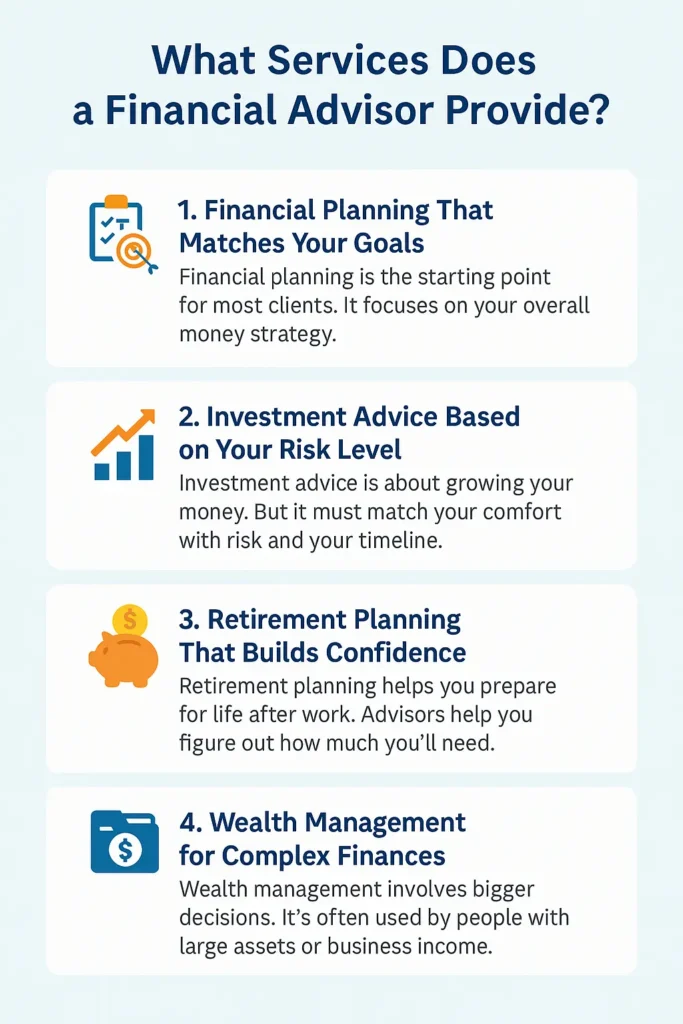Money decisions are hard. Planning for the future adds even more pressure. Many people don’t know where to begin. That’s when a financial advisor becomes important.
A financial advisor helps you make smart decisions with your money. Their job is to guide you based on facts, not guesses. They look at your situation and create a plan that works.
If you want to grow your savings, prepare for retirement, or get advice on investments, they can help. Their work is not just for the wealthy. People at all income levels can benefit from their services.
Why Should You Work With a Financial Advisor?
A financial advisor helps you see the full picture. They bring structure and support to your financial life. They know how to plan for today and prepare for the future.
Life Changes That May Call for Professional Help
Life comes with changes—new jobs, marriages, business deals, or family needs. These changes affect your money. A financial advisor makes those shifts easier to manage with a solid plan.
What Services Does a Financial Advisor Provide?

A financial advisor offers many types of help. Each service meets a different financial need. Some clients use all of them, while others need only one or two.
1. Financial Planning That Matches Your Goals
Financial planning is the starting point for most clients. It focuses on your overall money strategy. The advisor looks at your income, expenses, debts, and savings.
They then set short-term and long-term goals. Over time, they check your progress and adjust your plan as needed.
2. Investment Advice Based on Your Risk Level
Investment advice is about growing your money. But it must match your comfort with risk and your timeline. A financial advisor chooses investments that align with your goals.
They also explain your options in plain language. That way, you understand where your money is going.
3. Retirement Planning That Builds Confidence
Retirement planning helps you prepare for life after work. Advisors help you figure out how much you’ll need. They build a plan using savings, investment accounts, and expected income.
They also look at tax benefits and other tools to stretch your money.
4. Wealth Management for Complex Finances
Wealth management involves bigger decisions. It’s often used by people with large assets or business income. Advisors may work with your attorney or accountant to manage taxes and protect your estate.
They help keep your money organized and your long-term strategy focused.
5. Personal Finance Guidance You Can Count On
Personal finance guidance is simple, yet powerful. It covers things like budgeting, debt, and savings goals. A financial advisor helps you set clear priorities and avoid costly mistakes.
They also keep you focused when life gets busy or stressful.
When Should You Consider a Financial Advisor?
You don’t need to be rich to need an advisor. Many people wait too long. If you’re planning something big, now might be the time to ask for help.
Signs It’s Time to Get Financial Advice
- You’re starting a business or changing jobs
- You’ve received an inheritance or large sum
- You’re preparing for retirement
- You’re getting married or divorced
- You feel unsure about your financial future
How Do Financial Advisors Make Money?
Understanding how advisors get paid is important. It shows whether their advice is in your best interest.
Common Ways Advisors Earn Income
- Fee-only: A flat or hourly rate for their time
- Commission-based: They earn from products they sell
- Fee-based: A combination of fees and commissions
Always ask about fees up front. Make sure you’re comfortable with how they charge.
What to Look for in a Financial Advisor
Not all advisors are the same. Choosing the right one takes time and the right questions.
Key Qualities of a Trustworthy Advisor
- Certified (such as a CFP)
- Experienced in handling your type of needs
- Clear about their pricing and services
- Easy to reach and willing to explain
- Focused on your best interest—not selling products
Financial Advisor vs. Doing It Yourself
Some people handle money on their own. That may work when things are simple. But as your finances grow, so does the risk of mistakes.
Why Professional Help Often Saves Time and Stress
An advisor can spot problems before they grow. They give direction when emotions get in the way. They also save you time by doing the heavy lifting for you.
How Financial Advisors Help You Stay on Track
Your goals may change, but your financial advisor adjusts with you. They don’t set a plan and walk away.
The Ongoing Value of Expert Financial Help
- Regular updates to your financial plan
- Reviews to match your life changes
- Support during good times and hard times
- Peace of mind knowing someone has your back
Why a Financial Advisor Might Be the Smartest Call You Make

Working with a financial advisor is about more than managing money. It’s about making better choices, reducing stress, and preparing for the future.
A Simple Step That Leads to Better Financial Decisions
Advisors help with everything from planning to investing. They keep you moving forward. Their support helps you avoid common money mistakes. And they can give you confidence when you need it most.
Start where you are. Ask questions. Build a plan. Your future will thank you.
FAQs
A financial advisor helps you manage your money. They offer support with saving, budgeting, investing, and planning for retirement. They also create strategies based on your goals and income.
Yes. Financial advisors work with people at all income levels. Whether you’re paying off debt, saving for a home, or planning retirement, they help you make smart financial decisions.
Costs vary. Some advisors charge a flat fee, others charge by the hour, and some earn a commission. Always ask about fees up front so you know exactly what to expect.
Look for certifications like CFP (Certified Financial Planner). You should also ask how long they’ve been advising clients and what types of services they offer.
Yes. Retirement planning is one of their core services. They help estimate how much money you’ll need and create a plan to help you reach that goal.


